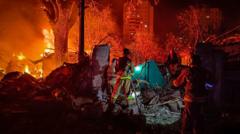Vice President JD Vance has declared that the U.S. may step back from mediation efforts between Ukraine and Russia unless an agreement is reached. This warning follows recent talks in London that lost momentum with U.S. Secretary of State Marco Rubio's withdrawal. While both nations continue casualties, Ukraine's President Zelensky remains firm on a ceasefire without territorial concessions, particularly regarding Crimea, posing challenges for ongoing negotiations.
U.S. VP Vance Issues Ultimatum Amid Ukraine-Russia Stalemate

U.S. VP Vance Issues Ultimatum Amid Ukraine-Russia Stalemate
As diplomatic tensions continue, U.S. Vice President JD Vance warns of withdrawal from negotiations unless Ukraine and Russia agree to a ceasefire proposal.
U.S. Vice President JD Vance has made it clear that the United States may withdraw from the ongoing negotiations between Ukraine and Russia if the two sides do not reach an agreement. His remarks came on the heels of diplomatic discussions that took place in London, which have lost some traction after the U.S. Secretary of State Marco Rubio and special envoy Steve Witkoff opted not to participate. The U.S. now shifts focus to upcoming talks in Moscow, where Witkoff is set for a fourth meeting with Russian President Vladimir Putin amidst a race against time to bring an end to the conflict.
Ukrainian President Volodymyr Zelensky has been vocal about his requirement for "an immediate, full, and unconditional ceasefire," emphasizing that halting the violence is the top priority. Vance informed reporters in India that the U.S. has presented an "explicit proposal" to both Ukraine and Russia, emphasizing the need for a decisive response. "It's time for them to either say yes or for the U.S. to walk away from this process," he asserted, highlighting the extensive diplomatic efforts made thus far.
The absence of Witkoff and Rubio has been met with confusion, as UK Foreign Secretary David Lammy hosted concurrent meetings aimed at solidifying support for Ukraine. Speculation mounts that Russia might consider ceasing its assaults at current front lines in exchange for substantial concessions; yet it remains unclear whether the talks will yield positive results. Vance has indicated the necessity for both Russians and Ukrainians to compromise on territorial claims amidst ongoing hostilities.
Zelensky has firmly rejected any discussions to formally recognize Crimea as Russian territory, as U.S. negotiations have sparked speculation around this sensitive topic. Following recent attacks, including devastating drone strikes that resulted in civilian casualties, the prevailing mood points towards a continued escalation of violence rather than peace. The U.S. State Department cited logistical reasons for the officials' withdrawal from the London talks, but it left British diplomats caught off guard.
Putin previously announced a temporary ceasefire during the Easter holiday. However, British military intelligence indicated no actual reduction in military operations, suggesting that the Russian President's overtures for peace may be tactical rather than sincere. With hundreds of thousands reported dead or injured since the conflict began over a year ago—and millions displaced—both countries face a complex path to peace amid frustration and diplomatic stalemates.


















